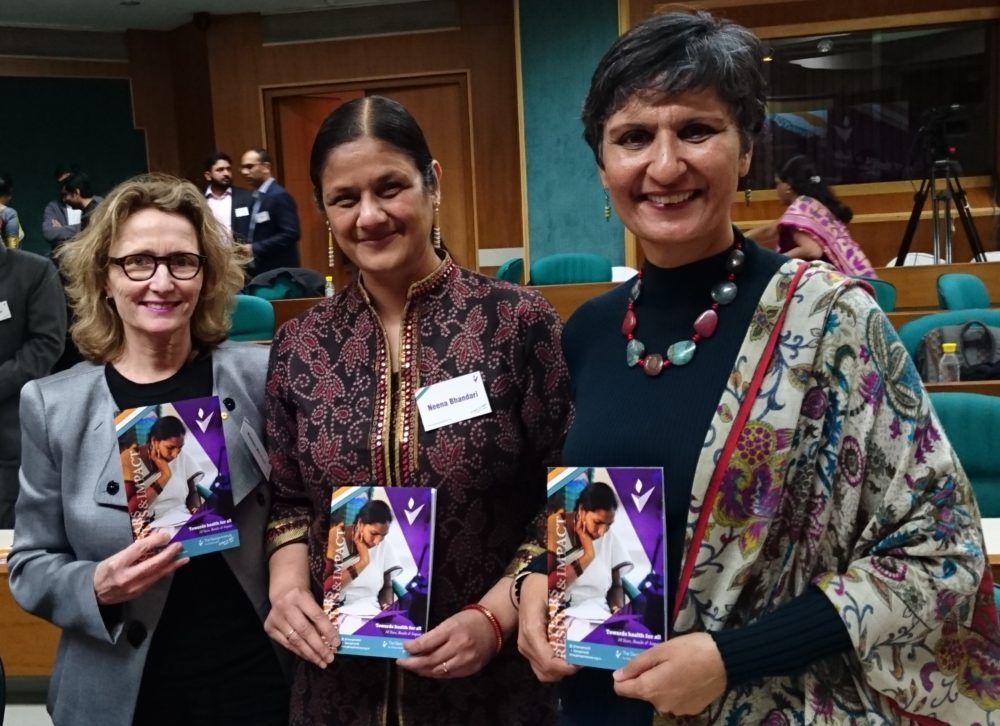By Neena Bhandari
Professor Robyn Norton grew up observing her parents’ commitment to equity and social justice in improving people’s lives in Christchurch, gateway to New Zealand’s South Island. It left an enduring impression on her young mind. The women’s movement was reaching its peak during her high school years. She got drawn into thinking about addressing women’s health issues and moved to Sydney, Australia, and enrolled in a Master’s degree in Public Health.
Fast forward to late 1990s. She says, “The global burden of disease was changing, particularly in lower and middle-income countries where Non-Communicable Diseases [NCDs] and injuries were emerging as a leading cause of death and disability. The expertise to manage the emerging epidemic of NCDs and injuries was not available in these countries. Most of the global collaborations between the high income and low-income countries were still focused on maternal and child health and under nutrition”.
“It was clear that global health policymakers needed to acknowledge and address these issues. Our expertise in NCDs and injuries, combined with our experience working in low and middle-income countries, made it the right time to set up The George Institute for Global Health in Sydney”, she adds.
WHY INDIA: Professor Norton, who is the Principal Director of The George Institute for Global Health, Professor of Public Health at the University of New South Wales in Sydney and Professor of Global Health at the University of Oxford, co-founded the Institute with Professor Stephen MacMahon in 1999. They realised that if they were to make a difference in the world, they had to be based in a country with a huge population. “India fitted our original idea because it was going through a transition with a triple burden of disease and changing demographics. It was starting to see under nutrition co-existing with over nutrition; infectious diseases beginning to co-exist with the growing incidence of cardiovascular diseases and strokes”.
Soon the Institute began collaborative partnerships for research in India. “The model of an external organisation partnering with colleagues in India to particularly address NCDs and injuries was a relatively new one for the country. The Institute’s biggest challenge was to raise the importance of NCDs and the need to address the burden of these diseases, including a focus on the burden of NCDs for women, which worldwide account for seven of the top 10 killers of women”, explains Professor Norton.
SIGNIFICANT STRIDES: In the past decade, the Institute has made significant strides conducting and producing research and research outputs that address the growing burden of NCDs in India and identifying more cost-effective approaches to healthcare delivery. Professor Norton says, “As a result, the Institute has now become a respected voice in promoting and providing evidence to guide healthcare policy and practice in India, as shown by its convening power in engaging government, non-governmental organisations and business leaders in addressing national health issues. Additionally, the Institute has become an important contributor to building public health and clinical research capacity in India”.
However, the percentage of the Gross Domestic Product [GDP] spent on health and funding to support health research within India is considerably lower than in most developed economies. “This is a potential challenge for the continued growth of the Institute. Nevertheless, within India, there is increasing recognition of the relevance and importance of evidence to guide healthcare expenditure, so this provides a potential opportunity for growth for the Institute”, she adds.
IMPORTANCE OF NCDs FOR WOMEN’S HEALTH: Professor Norton feels it’s time the global health agenda expands from a predominant focus on women’s reproductive organs to include women’s whole bodies — and the NCDs, such as heart disease, stroke, cancer, chronic respiratory disease and diabetes, as well as injuries.
“Today, the leading causes of death for women in almost every country in the world are NCDs and injuries. The Institute in India has been and will continue to be at the forefront of raising the importance of NCDs for women; to supporting a life course approach to the management of NCDs, which will require integrating the management of pregnancy with a focus on the prevention of NCDs in the longer-term; as well as promoting the importance of identifying and addressing sex differences and gender disparities in health. For example, we are using large insurance databases that can be publicly accessed, to determine whether the quality and quantity of care differs for women and men”, says Professor Norton.
GENDER SENSITIVE RESEARCH, DATA AND POLICY: She points out that evidence shows that there is a lack of gender sensitive research, data and policy, which is impeding gender equity in health. The Institute has joined a global call for a gendered approach to the collection and utilisation of health data.
“As we deepen our understanding of how the human body works, we know that women and men respond differently to disease and to possible interventions. We are also beginning to understand that health systems respond differently to women and men such that both access to care and the quality of care differs. Yet, far too commonly, there is no delineation of gender in health data, and women are under-represented in many scientific and clinical studies,” says Professor Norton.
ROAD TRAFFIC INJURIES: The other issue close to Professor Norton’s heart has been addressing the burden of road traffic injuries. “There has been a tendency to think about road traffic injuries as “accidents” or “acts of God” rather than as a health issue, that can be addressed through taking a systematic, evidence-based approach to prevention. Injuries in many respects fall between the world of infectious diseases and NCDs. As with other countries, India needs to look at the data, to identify causative factors, and to intervene, based on the best available evidence for prevention”, says Professor Norton.
She suggests that while it is important to educate the public about how speeding, drink driving, not wearing motorcycle helmets, seatbelts and child restraints, are associated with road traffic injuries, the best evidence suggests that introducing and enforcing relevant legislation will have the biggest impact in terms of reducing the burden of such injuries.
“It would make a huge difference in India. To ensure this happens, we need advocacy and leadership by governments, non-governmental organisations and academics, such as ourselves, to take these issues together,” she adds.
Note: This interview is part of the 10th anniversary of The George Institute for Global Health in India booklet.
ALSO READ: Women’s health policies should focus on NCDs
© Copyright Neena Bhandari. All rights reserved. Republication, copying or using information or photographs from neenabhandari.com content is expressly prohibited without the permission of the writer and the media outlet syndicating or publishing the article.


